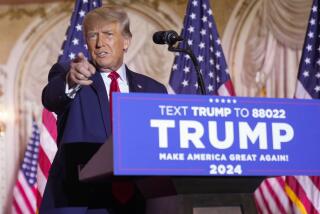Rostenkowski Shifts, Opposes Capital Gains Cut
- Share via
WASHINGTON — House Ways and Means Committee Chairman Dan Rostenkowski (D-Ill.), reversing direction again, says that he no longer is considering a capital gains tax cut for this year.
Rostenkowski, whose decision to open the door to a possible compromise with President Bush on capital gains was first disclosed in May, has decided to retreat to his original position because of vehement opposition by House Democrats.
Rostenkowski had been floating the idea of a one-year reduction in the capital gains rate, which could generate as much as $15 billion in extra revenue by inducing investors to sell stocks, bonds and other assets that had appreciated in value.
Tax Proposal Ridiculed
But that proposed temporary rate cut, even though it was supposed to be followed by a plan to adjust the capital gains rate for inflation, was ridiculed as bad tax policy. Moreover, most Democrats continued to object to cutting capital gains as an unnecessary giveaway to the wealthy.
The chairman of the tax-writing panel announced his turnaround on the issue in an interview published Thursday in the Wall Street Journal. His new stance was confirmed by aides.
Instead of relying on a cut in the capital gains tax to generate most of the additional $5.3 billion in tax revenues called for under the congressional budget resolution for the fiscal year that begins Oct. 1, the Ways and Means Committee is looking at numerous small changes in tax provisions.
Sharp Market Decline
Some analysts said that Thursday’s sharp stock market decline was caused by Rostenkowski’s change of heart, although others said that it was caused by spreading signs of economic weakness and a jump in European interest rates.
The Administration still hopes to keep alive Bush’s plan to slash the maximum tax on capital gains--which are paid on profits from investments in stocks, bonds and certain other assets--to 15% from its current top rate of as much as 33%.
“We’re going to continue to press for a capital gains tax cut,” a Treasury official said. “It’s still our view that there aren’t enough miscellaneous loophole closers to reach $5.3 billion.”
Bush had indicated Wednesday in an interview with The Times--before the Rostenkowski interview in the Journal--that he was not certain of the Ways and Means chairman’s stance on capital gains, but the President said that he still hoped to persuade Congress to go along with the proposal.
“If we can convince the various members of Congress that this approach is correct, that will take care of a major requirement for revenue,” Bush said.
Meanwhile, House and Senate budget officials are just beginning to look at ways to follow up this year’s relatively trivial deficit-cutting agreement with a major, multiyear package that would include an equal mix of tax increases and spending cuts.
“We’re still proceeding on two tracks,” said Rep. Leon E. Panetta (D-Monterey), chairman of the House Budget Committee. “The first track is to complete this year’s package, but, as I have made clear all along, the second track is to pursue a much bolder deficit reduction plan for future years involving some give on the President’s . . . pledge (to oppose any tax increases) combined with dollar-for-dollar spending cuts on the other side.”
Both Republican and Democratic aides said that White House Budget Director Richard G. Darman has hinted at his willingness to consider later this year a larger budget package involving higher taxes but has made it clear that Bush is not necessarily willing to back away from his no-new-taxes pledge.
“We haven’t sent out any new tax signals,” a senior Administration budget official said. “Right now, we have to get the 1990 budget savings before going on to the next stage. But we’ve always been willing to talk about anything that comes up.”
But Treasury Secretary Nicholas F. Brady, a spokesman said, has not discussed any ideas with lawmakers for raising taxes in future years.
Although Bush’s opposition to higher taxes remains an important hurdle in future budget negotiations, officials said that congressional unwillingness to cut spending remains an equally difficult stumbling block.
No Political Consensus
“Even with a good-faith effort from the Administration, there’s no political consensus that we can take on the tough choices,” Panetta said.
Rostenkowski might be prepared to revive Bush’s plan for a capital gains tax cut, one budget aide speculated, in return for Bush’s willingness to go along in the future with tax increases that would provide revenues for certain social programs and prevent the wealthy from reaping any windfall tax savings.
More to Read
Get the L.A. Times Politics newsletter
Deeply reported insights into legislation, politics and policy from Sacramento, Washington and beyond. In your inbox three times per week.
You may occasionally receive promotional content from the Los Angeles Times.










